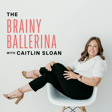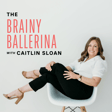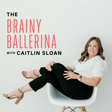
44. The Art of Pivoting: Krystle Frey’s Path from Professional Dancer to Podcaster
In this episode, I'm joined by Krystle Frey, former professional dancer and founder of Pivot Ball Change. We get into Krystle’s journey from student to professional dancer, and how her experiences shaped her path as a podcast host and business owner.
Key topics:
✨Krystle's early dance journey and training in Wisconsin
✨Her professional dance career which started while she was still in high school and included gigs such as dinner theater productions and cruises.
✨The importance of building connections in the dance and creative industries
✨How becoming a mom led Krystle to launch her podcast for creative moms and later expand her business into podcast editing
✨Practical tips for starting a podcast, including monetization strategies and maintaining consistency
My biggest takeaways from this episode included the power of building connections in the dance industry and the reminder that “no” sometimes just means “not right now”. If you need some positive, practical advice to help you keep going in this crazy dance world, this episode is for you!
Connect with Krystle:
INSTAGRAM: instagram.com/pivotballchange
WEBSITE: pivotballchange.com
Download your copy of "How to Start a Podcast with Pivot Ball Change"
Links and Resources:
Get your copy of The Intentional Career Handbook
Get 20% off your first order of ALOHA protein bars: https://aloha.com/BRAINYBALLERINA
Be by Jessica Zweig (affiliate link)
1-1 Career Mentoring: book your complimentary career call
Let’s connect!
My WEBSITE: thebrainyballerina.com
INSTAGRAM: instagram.com/thebrainyballerina
Questions/comments? Email me at caitlin@thebrainyballerina.com


